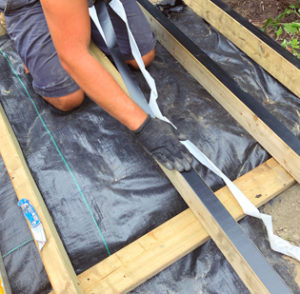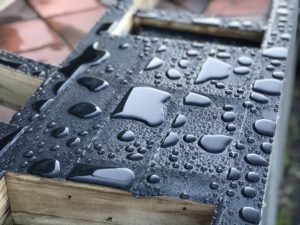Best Waterproof Tape
By Dave KileWith so many options to choose from, finding the right waterproof tape for your project can be a difficult task. Check out the guide below to learn why butyl seal tape beats the rest for tough jobs.
What to Look for in a Waterproof Tape
 Adhesiveness:
Adhesiveness:
Choose your waterproof tape based on the strength and effectiveness of the adhesive. Waterproof tapes tend to last for about five years before the adhesive starts to break down. Still, outdoor use variables like extreme temperature changes, direct sunlight exposure, and physical stress can decrease its lifespan.
You’ll want to go with a waterproof tape that will meet your project’s adhesive requirements of strength. For example, if you’re working on your outdoor deck, you’ll want a tape that can withstand the elements like rain, snow, and low temperatures for an extended period of time. It will also need to create a tight, waterproof seal with the surface of your deck to prevent running water from getting in and peeling away the tape.
Flexibility:
It’s also crucial that you can use the tape you choose for different purposes. Butyl tape is great because it adheres to a wide variety of surfaces, such as glass, metal, plastic, and wood. Both butyl and silicone rubber are great outdoor waterproof tapes for sealing up a leak in the roof or patching a hole in a boat.
Durability:
Always pick heavy-duty adhesive tape with a reliable warranty. When working on outdoor projects, you want to be sure that you can ensure the lifetime of your investment by reinforcing it with strong adhesive tape.
Trex Protect Butyl Tape
Butyl tape is a solvent-based rubber adhesive developed to augment traditional rubber adhesives. Because it is UV resistant, less temperature sensitive, and maintains adhesion at lower temperatures than natural rubber, butyl is an excellent solution for outdoor, waterproof tape.
Butyl tape adheres to most surfaces instantly because it conforms to the material, making it an excellent repair tape for various situations around the house. The flexibility bonds work well when moisture is a factor, such as creating a flex seal for an outdoor deck. Butyl is a flashing tape that holds water out, seals around decking screws and fasteners, and is impermeable to air. In addition, it is a thick adhesive with high tensile strength making it optimal for deck building since it won’t break when stretched.
It’s also often a more affordable option than acrylic or silicone tape! Check out this buying guide on how to find the right materials for your deck project!
Duct Tape
Duct tape is a strong tape made of cloth construction and is a common fixer around the house and in many industries like HVAC and automotive. It is covered with polyethylene resin coating, making the tape waterproof. However, while it is easy to use, it does not provide any real water resistance, so it needs to be coated with another substance to be truly effective on wet surfaces. These coatings can also leave behind some residues that can be tough to get rid of.
Duct tape is also not very durable and will degrade when used in adverse conditions compared to most specialized tapes.
Silicone Tape
Made from cured silicone rubber, silicone tape typically contains a thin layer of silicone gel to make the product self-fusing, forming a permanent bond around whatever it is applied to. However, depending on the size of the project, this bond can take some time to form, even up to 24 hours until it is sealed. It is also thinner than your average rubberized tape, making it a bit less durable. Because it is more temperature-sensitive, it also can lose its adhesiveness in the extreme cold.
Electrical Tape
Although very stretchy and elastic, electrical tape is not waterproof. Because this adhesive would likely lose its properties when wet, waterproof electrical tape is simply not practical nor possible. Instead, most electrical tapes have a specific weather and water resistance level. Therefore, it can work in situations where minimal moisture is involved but not in an environment where large amounts of liquid are involved.
Electrical tapes are better suited for minor DIY electrical tasks such as repairing or joining small cables.
Drywall Tape
It isn’t waterproof, but it uses water to become more malleable and adhesive, allowing the tape to properly fill the gaps between two drywall pieces and eliminating the indented look that can come from drywall compounds. Moisture-resistant drywall tape is a good choice for the bathroom, kitchen, and other rooms subjected to high levels of moisture and humidity.
Gaffer Tape
Like duct tape in strength and adhesion, gaffer tape is more resistant to heat and easier to remove without leaving behind a sticky residue. However, gaffer tape has a heavy cotton cloth backing that makes it a water-resistant tape, not waterproof. Also, waterproof gaffer tape is a specialty product that might be difficult to find. Many gaffer tapes use neutral color-coding so that your repairs will blend into the house exterior so as not to draw extra attention.
In the end, you want to be sure to choose a type of tape that will work best towards your project’s needs. For example, while duct tapes like Gorilla and T-Rex can be great fixer tapes for some outdoor projects, they don’t have the versatility and long-term durability that butyl tape provides. So be sure to choose something long-lasting, with good functionality in extreme weather conditions, and with a good warranty!